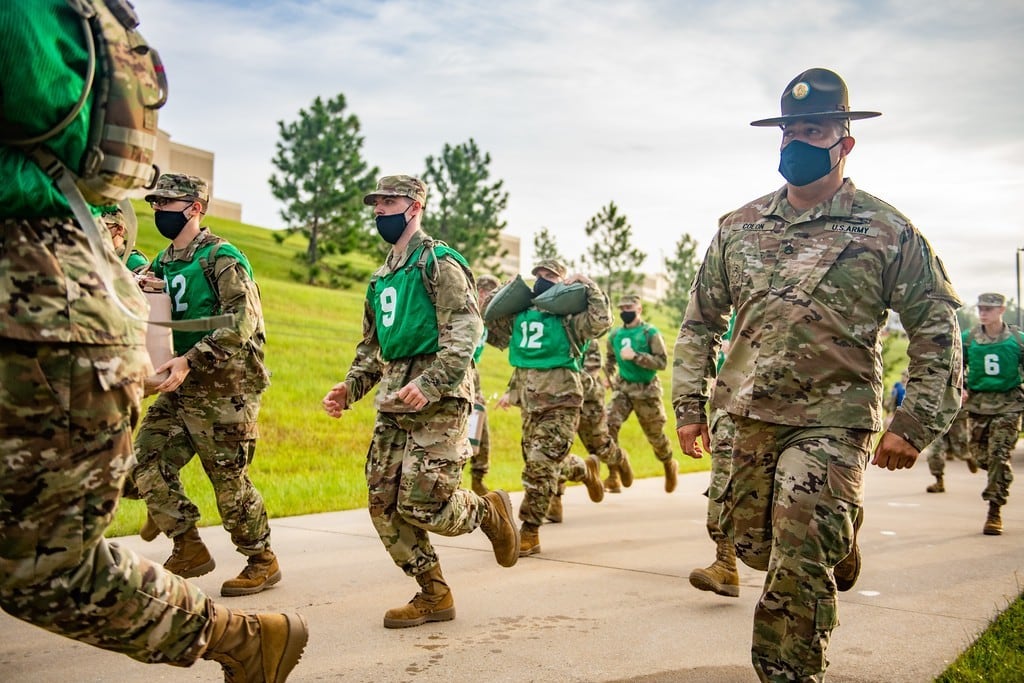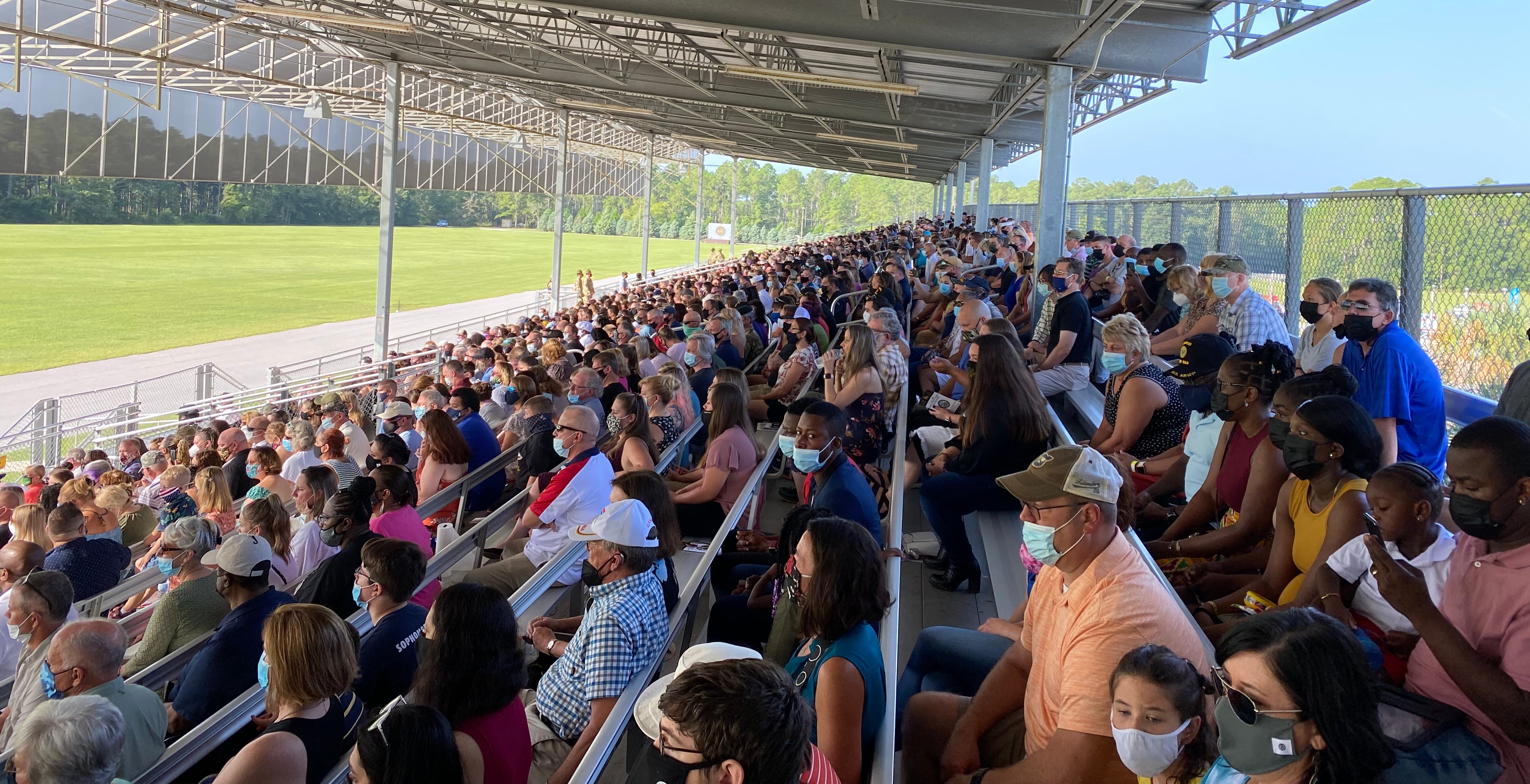FORT JACKSON, S.C. — At a hazy, humid Thursday morning ceremony on Fort Jackson’s Hilton Field, some 951 basic combat training graduates from 1st Battalion, 34th Infantry Regiment, marked the beginning of their Army careers.
Thousands of their friends and families clapped and cheered from the stands.
And every single adult guest there was vaccinated against COVID-19, in accordance with a new policy ordered earlier this month by Fort Jackson’s commanding general. Family members had to show their proof of vaccination in order to enter the installation.
RELATED

Army Times spoke with trainees, parents and the battalion’s commander about the rule and how it impacted their vaccination decision.
When the mandatory vaccination policy for guests was first announced in a unit Facebook post from battalion commander Lt. Col. Mike O’Donnell, the reaction was fast and furious.
“We probably got within the first 72 hours upwards of 800 [comments],” he told Army Times in the bleachers after the ceremony. “There were a handful of aggressive comments, saying ‘How dare you force me to be vaccinated’…Some of the most aggressive ones, we had to [hide] them.”
The post included detailed instructions for family members who wanted to get the shot in order to make it to graduation — they had only 72 hours to find the Johnson & Johnson vaccine in order to be considered “fully vaccinated” in time, O’Donnell explained.
Initially, the battalion’s graduation was intended to include unvaccinated guests, too. But the highly-contagious Delta variant of the coronavirus — and rising case and hospitalization numbers in the surrounding community — led Brig. Gen. Patrick Michaelis to change the post access guidelines on short notice.
In response, many hopeful graduation guests scrambled to locate the vaccine in time to attend.
One such guest was Steve Manthei, a retired Army staff sergeant whose son is next headed to AIT as a fire support specialist.
“We had not [received our vaccines]” before learning of the requirement, Manthei told Army Times after the ceremony. “We live in a rural area of Kentucky, just not around a lot of people. I live on a farm.”
And the delta variant began to surge just as he and his wife made their shot appointments.
“Things are picking up even in our county. My sister tested positive; her husband tested positive,” Manthei noted. “Vaccinations have been part of my life since I was 18 — it was a no-brainer.”
Trainees and family members who were vaccinated long before the attendance requirement expressed gratitude, as well.
“[This requirement] wasn’t a big shocker, because it’s becoming mandatory in a lot of places,” said Pvt. Cheyenne Combs, a split-option training soldier from Norfolk, Virginia, who will return to school at Virginia Commonwealth University next week before going to AIT next summer as an automated logistical specialist. Her university is requiring on-campus students to receive the vaccine as well.

She empathized for her peers whose family members opted to skip the graduation instead of getting the shot.
“There are a lot of people whose families don’t believe in the vaccine, and were not vaccinated, and had planned on coming, and even had already made [travel] arrangements,” she said. “So, for them, it was a big shocker…not everyone was pleased, but under what we’re going through throughout the country, I think it is mandatory for the protection of us soldiers and the families here today.”
Retired Army Lt. Col. Billy Cook — who described himself as Combs’ “bonus dad” — told Army Times that the vaccine requirement makes sense, given the conditions of basic training.
“I knew the Army was going to do the best thing for the soldiers,” Cook said. “If one soldier gets even a cold, potentially the whole company can get it. So if a cold spreads like that, imagine what COVID would do.”
And he would know. He was stationed at Fort Jackson as a company commander and as a training battalion executive officer before he retired.
In recent months, despite the surge in cases off-post, COVID-19 mitigation measures have kept the number of trainee cases low at Fort Jackson.
O’Donnell, a Special Forces officer, said his battalion had only a “handful” of positive tests this training cycle, and noted that 75 percent of his trainees had accepted the vaccine.
He expressed regret that unvaccinated family members weren’t able to attend, but noted his commitment to protecting his soldiers and upholding Fort Jackson health protocols.
“They’re missing out on a very important milestone in their young soldier’s life,” O’Donnell explained. “They’re graduating from something that most of them have never known they could do.”
“With a little bit of dedication, and a little bit of discipline, the formations can stay healthy and we can keep the train moving forward on basic combat training,” he said.
Davis Winkie covers the Army for Military Times. He studied history at Vanderbilt and UNC-Chapel Hill, and served five years in the Army Guard. His investigations earned the Society of Professional Journalists' 2023 Sunshine Award and consecutive Military Reporters and Editors honors, among others. Davis was also a 2022 Livingston Awards finalist.




